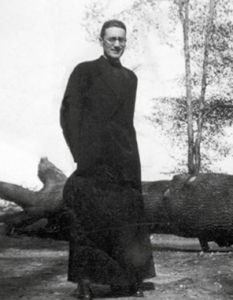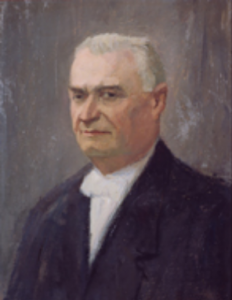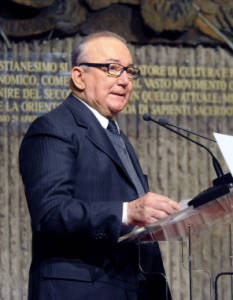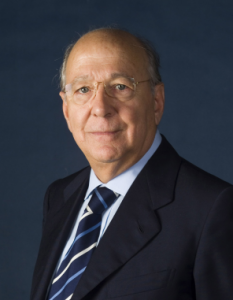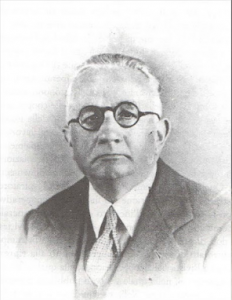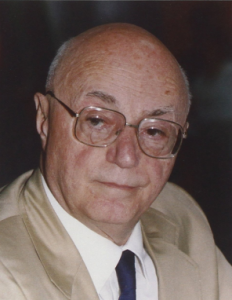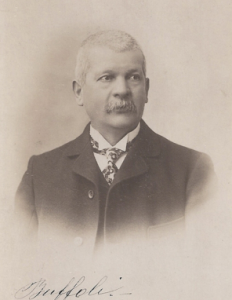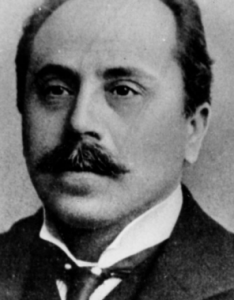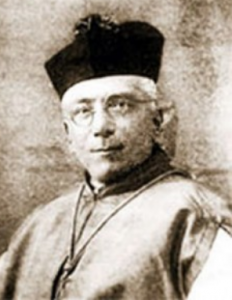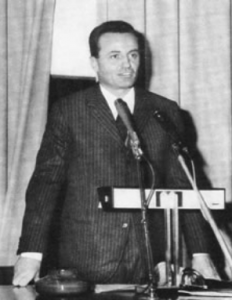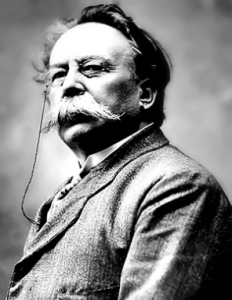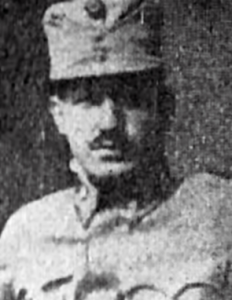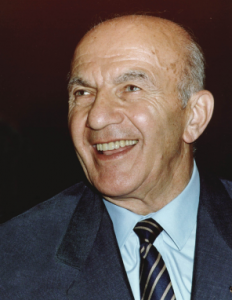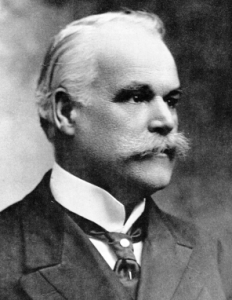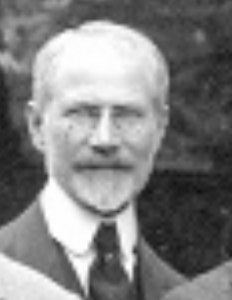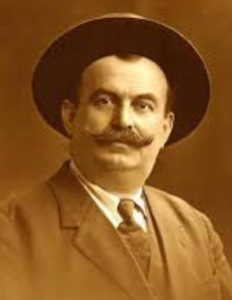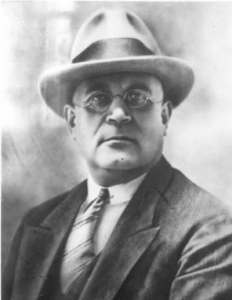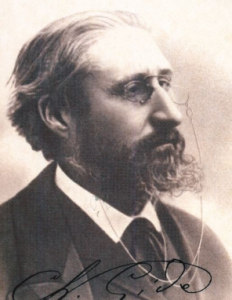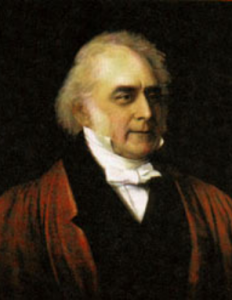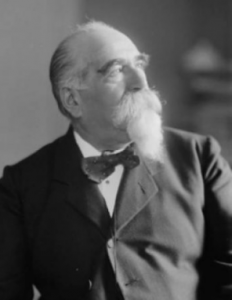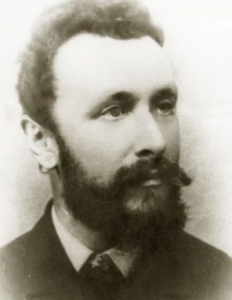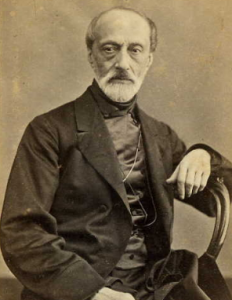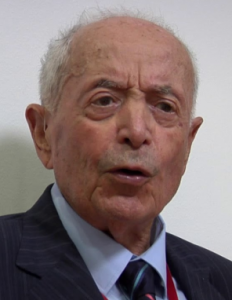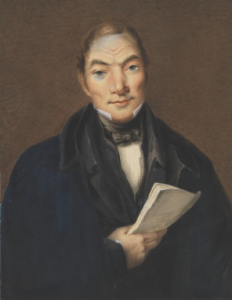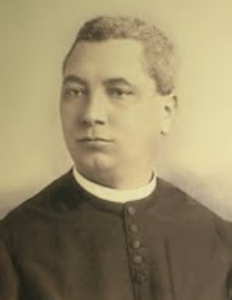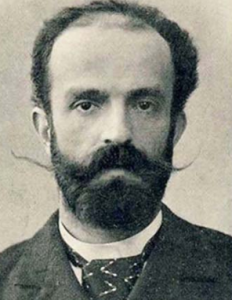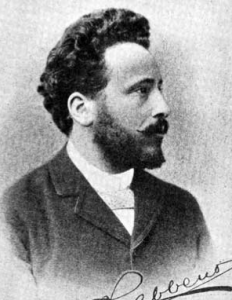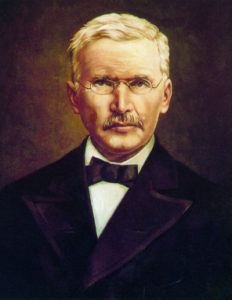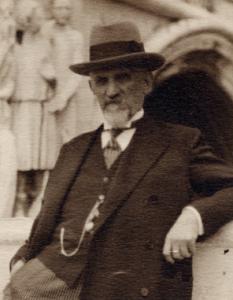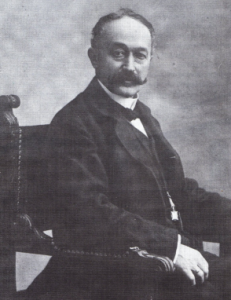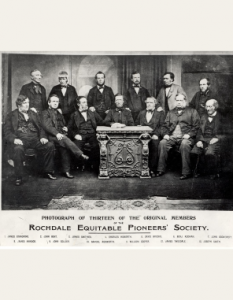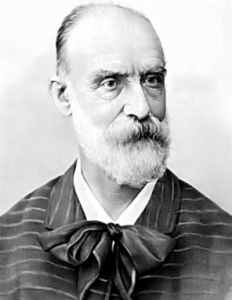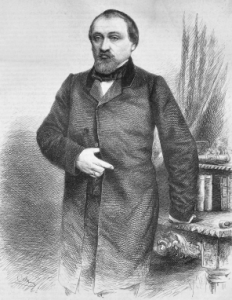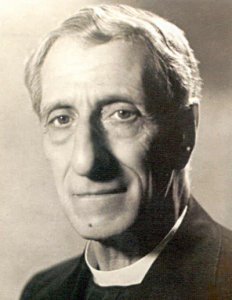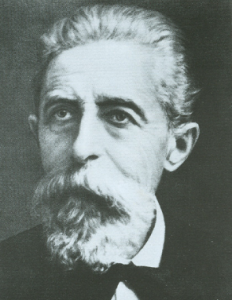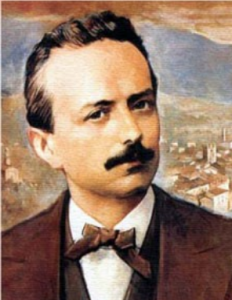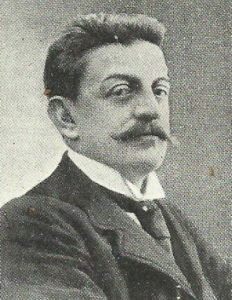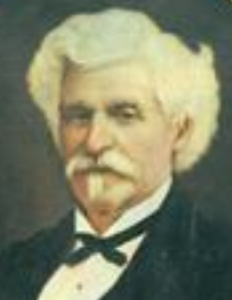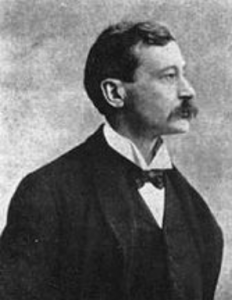Characters
José María Arizmendiarrieta (Vizcaya 1915 - Mondragón, Guipúzcoa 1976)
He was a catholic priest from the Basque country, he stood out for the cooperative initiative in the village of Mondragón, where he arrived in 1941. In 1943 he founded a polytechnical school that later became the university of Mondragón: it was the birthplace of the local cooperative movement, open to all native young people and managed according to democratic principles. In 1956 the Ulgor was created on the initiative of Arizmendiarrieta and a group of graduates of Mandragón created, that became Fagor Electrodomésticos, the first step of the intense and varied cooperative development of the region. To be continued →
Nullo Baldini (Ravenna 1862-1945)
He was born in Ravenna from a family of Garibaldi traditions, since he was a young boy he committed his life to socialist associations, in order to give power to the labourers and the weaker classes. His name is linked in particular to the “scariolanti”, the very poor workers who, with just the strength of their arms, were tasked with draining the marshes of Polesine and Bassa Romagna, destroyed by malaria (mortality during the first years was over 20%). He was a promoter, with the help of its 303 members, of the general Association of labourers, actively involved both in reclamation works (especially in Agro Pontino) ... To be continued →
Ivano Barberini (Modena 1939 - 2009)
Cooperative manager, first and only Italian ICA- International Co-operative Alliance president.
He played different roles in the cooperative field, both as business management and at an economic social research level.
For Barberini “the cooperative is a hornet that, in its long history, showed he could fly, despite the laws of physics. Anyways in order to continue flying and reaching its goal that, as all social purposes, is always on the horizon, it constantly has to face the challenges imposed by society. From 2001 until 2009, that means until his death, he was the first Italian CA-International Co-operative Alliance president, ...
To be continued →
Enzo Badioli (Pesaro 1921 - 1995)
Enzo Badioli was active in the Italian cooperative world and in its modernisation after the end of WWII. Of particular importance is his contribution to the development of the Cooperative Credit Institution of Rome. He was born in Pesaro in 1921, was a teacher, socially and politically active. He was nominated president of “Ente Nazionale Casse Rurali” ( National Organisation of Credit Unions), had the task of revitalising and modernising the organisation that had laid its foundations in 1883 with the establishment of the first “cassa cooperativa di prestiti” (cooperative fund for loans) in Loreggia for the will of Leone Wollemborg. To be continued→
Alberto Basevi (Modena 1882 - Roma 1956)
He came from a Jewish family, was a pupil of Luigi Luzzati and manager of the national League of cooperatives. Basevi was secretary of the newly constructed National Credit Institute for cooperation that over the years will be transformed into National Labour Bank (an institution of which he was central manager). During fascism he had to abandon his office due to his origins, but with the affirmation of the Republic he was once again the driving force behind the organisation of the cooperative world. He contributed to the rebirth of the League of cooperatives and promoted the “Basevi law”, ... To be continued →
Giovanni Bersani (Bologna 1914-2014)
Italian politician, Christian Democracy member, elected at the Italian Parliament and European Parliament, committed to social, solidarity and peace cooperation. He contributed to the foundation of the Christian Workers Movement, was ACLI vice president and for the political experience he was undersecretary of the Ministry of Labour and Social Security in the De Gasperi Government VII in the period 1952-1953. Founder of CEFA- European Committee for the Training and Agriculture (1972), NGO operational still today in the Balkans, in South America and in the sub-Saharan Africa. To be continued →
Luigi Buffoli (Chiari 1850 - Milano 1914)
He founded the first consumer cooperative among the railwaymen in Milan, drawing inspiration from the English experience of Rochdale that later became the cooperative Union of Milan. However, unlike the Rochdale cooperation, the cooperative Union worked predominantly between middle class and professional employees, and pursued profit aims by selling at market price- in this it followed the English cooperation- rather than at cost price, in accordance with the need, in order to “not disturb the general market conditions” and simultaneously “fulfil a function of Cassa di Risparmio that doesn’t pay interests”. To be continued →
Enea Cavalieri (Ferrara 1848 - Roma 1929)
Jurist and traveller, he was attentive to the dynamics and problems of the agricultural world and its workers (he called himself a liberal-social), in addition to promoter of the cooperative model. It was especially in his interest the application of cooperative logic to the agricultural world (joint purchase of materials by farmers, organisational forms, etc..) His trips allowed him to appreciate the value of associative experiences in different contexts and to bring this know-how within Italian institutions such as the Ministry of agriculture, industry and commerce and the agricultural Council. To be continued→
Luigi Cerutti (Venezia 1865-1932)
He was a priest, leader of catholic cooperativism, he founded the first confessional “cassa rurale” in Italy in Gambarare (a village in the Venetian hinterland). The terrible conditions the population, mostly composed of farmers, was experiencing, urged him to act concretely to improve the economic conditions of his people. In an inquiry of the time peasants were described as “brutes, intoxicated by the mephitic air always feverish, with death before their eyes, condemned to die young”. The reference model was that of Raiffeisen in Germany and the intent was triple: economic support to rural population, diffusion of catholic values, ... To be continued →
Mario Cesari (Firenze 1926-1968)
He has communist ideals and he was a partisan during the war.
He was actively involved on a cooperative level, he highlighted how the experience as a partisan already had a cooperative modus operandi in supporting the communities in difficulty and particularly since the end of the 1940s he encouraged the Union of cooperatives of Mugello and he was president of Federcoop in Florence.
He was president and CEO of AICC,(the future “Coop Italia”) bringing renewal and developing new strategies.
To be continued →
Ercole Chiri (Pavia 1890-1980)
Catholic cooperation leader, he was among the supporters, with don Luigi Sturzo, of whom he was a collaborator, of the Popular Party in 1919. In 1919 he contributed to the foundation of the Italian Cooperative Confederation of which he was the Secretary General. In the intervention of the first national congress of Christian cooperation (2-3 aprile 1921) Chiri draws the dividing line between three types of cooperation: ”Between the program of the liberal school that, even if it was able to give an increase to the wealth, it sacrificed the holiest and most delicate religious, moral and domestic relationships for it, ... To be continued →
Andrea Costa (Imola 1851-1910)
He approached anarchism as a young man,and then approached the democratic and reformist socialism. As an intellectual he supported the role of cooperatives as the focus of the democratisation process of society. In order to improve the working class conditions Costa believed that a gradual work was necessary, composed of “practical means”, associative forms as the trade union and cooperatives. He privileged a relationship with some of the main leaders of Italian cooperation, amongst them Giuseppe Massarenti, Nullo Baldini, Camillo Prampolini. To be continued→
Augusto Degasperi (Trento 1893 - Milano 1966)
Brother of Alcide , he studied in Vienna and graduated in Padua. During the Great War he was sent to Galice, with the third Kaiserjäger Regiment. In 2015 the journal regarding the war period was published: “Kaiserjäger in the Carpathians. War journal 1914-1915 by cadet Augusto De Gasperi", thanks to the editing and transcription done by his children. After coming back to Trento he accepted different cooperative roles (in the early post-war period he was SAIT president and vice-president, he took part in the Government Commission of Venezia Tridentina for the revision of consumer cooperatives and ... To be continued →
Giovanni Dalle Fabbriche (Ravenna 1914-1992)
He was born in Brisighella (Ravenna), he was a preeminent figure of the development in Romagna and in the country. He was Secretary of the Federation of Direct Farmers of the municipality of Faenza: with this role he committed to the formation of the trade union and economic movement of the farmers. He was city councilor in Faenza from 1961 until 1970 and since 1962 he was entrusted with the presidency of the Professional School for “Caldesi” Agriculture. From 1965 until his death he was also president of the “Cassa Rurale ed Artigiana” of Faenza. During these years the effort for promoting new cooperative experiences was major. To be continued →
Alphonse Desjardins (1804-1920)
Born in Québec, he is considered the pioneer of cooperative credit experience in Canada,on the model by Friedrich Wilhelm Raiffeisen. The Caisse Populaire de Lévis was created in 1900, thanks to him and to his wife Dorimene Desjardins and it gradually expanded its activity in the whole Québec. His experience at the Parliament, moreover, enabled the drafting of a legislation on cooperative matters for Canada. Desjardins contributed as well to the creation of the first credit cooperative experience of the United States, the St. Mary’s Credit Cooperative Association a Manchester in New Hampshire. To be continued→
Georges Fauquet (1873-1953)
(In the picture he is the third standing from the left) He was the theorist of the cooperation as “third sector”, together with the public one and capitalist one. Unlike Gide, he interpreted the cooperative sector as complementary to the others in a mixed economy, not as a complete replacement (according to Fauquet there were four sectors: public, capitalist, private, cooperative). Cooperativism as a part of the economy of a country, to Gide, represented the union between economic factor and social factor. So he wrote, identifying what for him were the two cornerstones of cooperativism ... To be continued →
Giovanni Faraboli (Parma 1876-1953)
Born in Fontanelle, close to Parma, he was one of the leading representatives of cooperativism in Parma. He had socialist ideas, contributed to the organisation of the trade union movement and farmers’ league movement, encouraging the workers’ efforts at cooperative level, efforts of alphabetisation and support, according to a design of “full cooperativism”, similar to the Reggio model established by Antonio Vergnanini. Margherita Becchetti writes: “he dreamt of a full cooperation, an economic network in the workers’ hands, alternative and competitive with market rules dictated by the agrarians, made of cooperatives, ... To be continued →
Romeo Galli (Imola 1872 - 1945)
He was a librarian and cooperative member, from 1892 he became part of the Socialist Party. He got the technical licence and, after being employed at the registry office in Imola, he worked as a librarian assistant at the Municipal Library in Imola from 1890, he became its executive director from 1895 until 1898 and later managing director until 1938, when he left the office for reasons of age. He was one of the pioneers of the working and socialist movement in Imola and Andrea Costa’s pupil. From a modest background, he approached very young the socialist and marxist mindset, ... To be continued →
Charles Gide (1847-1932)
Economist, intellectual and cooperative member, founded the school of Nîmes in 1885, inspired by the Rochdale principles: the historians make this moment coincide with the beginning of consumer cooperation in the country. Gide gave thus an impulse to the creation of cooperative experiences, until founding the national federation of consumer cooperatives, the Union coopérative. It was simultaneously an essential piece for the studies of politic and social economics in France. In his work “La cooperation” (1900) he defines cooperative business as an alternative to the capitalistic enterprise, ... To be continued →
William King (1786–1865)
He was a doctor and philanthropist in Brighton, he was among the founders of a consumer cooperative in 1827 in Brighton, the “Brighton Co-operative Benevolent Fund Association”. Great thinker, forerunner of the Christian-social school, he founded the periodical “Co-operator”, that provided a set of theoretical-philosophical principles and concrete tips on the management of a cooperatives store, an inspiration for the peers and a source of influence for the rising cooperative movement. The periodical had a short life: from 1st May 1828 until July 1830. In all its issues the magazine reported ... To be continued →
Luigi Luzzatti (Venezia 1841 - Roma 1927)
He was of Venetian origins, studied at the political-legal Faculty of the university of Padua. He was a politician of the historical Right wing, father of the popular cooperative credit in Italy, inspired by German experiences. As soon as he graduated, at the age of 23, he published his first scientific work “La diffusione del credito e le banche popolari (Padova 1863)”, in which, referring to H. Schulze Delitzsch, he advocated the social role of credit, bringing together in an original mixtum compositum the need of voluntary savings and provisions of low-cost capitals, financial accumulation and risk mitigation, fight against usury and development prospects. To be continued →
Giuseppe Massarenti (Bologna, 1867-1950)
He was a reformist socialist, from an early age he dedicated himself to the organisations of labourers and rice weeders in Molinella, his native village. During his pharmacy studies at the University of Bologna, he got in contact with Andrea Costa, developing the need for protection in favour of labourers and sharecroppers of Bologna, hit by misery and diseases (such as pellagra). In order to elevate the working class he believed necessary a triple use of means: A strong trade union, A diffused cooperation, An administration of municipalities by socialists. To be continued →
Giuseppe Mazzini (Genova 1805 – Pisa 1872)
He was a politician and a philosopher, one of the most significant personalities of the Italian Risorgimento and one of the recognised founders of the Italian cooperativism. His person and his influence are located in the period of origin of the workers’ movement, union movement and cooperative movement. In 1860 he wrote his fundamental text “Dei doveri dell’uomo”. We can read: “we must not abolish property because today it belongs to few people; we must open the way so that most people are allowed to buy it. It must be based on the principle that makes it legitimate, making sure that only work can produce it”. To be continued →
Enea Mazzoli (1927-2019)
He was born in the province of Bologna, he was a key player of the civil reconstruction and cooperative movement after joining the Resistance. He remembers how “in many cases the cooperatives had become actual centres of partisan struggle, armed units of combat”; fascism had targeted the cooperative movement, yet - Mazzoli underlines- “it was astonishing the rapidity by which in a few months, after the dark and persecutory parenthesis of more than twenty years of fascism, which brought stagnation, regression, waste of large assets, degeneration of the aims, after the attacks, fires, devastations, ... To be continued →
Robert Owen (1771–1858)
He was a Welshman, businessman, cotton trader and socialist utopian, he is considered one of the fathers of cooperativism. He was an academic of social sciences and pedagogy and he developed a vision for improving society through education. In his factories in New Lanark, Scotland, he experimented with a futuristic management model: better salaries, life and working conditions favourable to workers, asylum and education. The formula proved to be successful; it combined better life and working conditions to satisfactory economic results. To be continued →
Ambrogio Portaluppi (Milano 1863-1923)
He was a priest in Treviglio (Bergamo), he worked in favour of the rural populations and of the creation of associative and supportive realities and to the unprivileged. He studied theology in Rome and came back to Milan in 1886, to go then to Treviglio in 1891. 1891 was also the year of the Encyclical Rerum Novarum by Pope Leone XIII: the activity and thought of Portaluppi will be part of the renewal of the church connected with the social doctrine, focused on the observation of the life conditions of people, the attention on the weakest and their redemption and on the construction of a fairer society. To be continued →
Camillo Prampolini (Reggio Emilia 1859 - Milano 1930)
He was a jurist, studied in Rome and Bologna graduating with a thesis on the right to work. Socialist reformist, he intended cooperation as a way towards a new and equal society, an alternative economic option. He approached the socialist circles of Bologna during his studies and began to write on “Lo Scamiciato”, an international local newspaper, interpreting socialism as a natural evolution of society. He entered in the social circles of that time, corresponding with Andrea Costa and Antonio Labriola and approaching the reformist socialism by Turati. To be continued →
Ugo Rabbeno (Reggio Emilia 1863 - 1897)
He was one of the most brilliant and alert scholars of cooperation as a phenomenon, both at international and Italian level. He graduated with a thesis on the English cooperative movement and he was among the first to academically and scientifically approach the phenomenon at an economic and ethical level. He wrote “La cooperazione in Italia. Saggio di sociologia economica (1886)” and “Le società cooperative di produzione. Contributo allo studio della questione operaia (1889)” that addressed the scholars of the following years. For the economist of Reggio, cooperation aimed at unifying, at weaving networks and relationships, ... To be continued →
Friedrich Wilhelm Raiffeisen (1818-1888)
Frederich Wilhelm Raiffeisen was born on 30th March 1818, in the little village of Hamm on the river Sieg, a tributary of the Rhine that flows between Bonn and Koblenz. He was the seventh of nine siblings,had by Amalie Susanna Maria Lantzendorf and Gottfried Friedrich Raiffeisen. The father, from Mittelfiscach, was a mayor (burgomaster) and Protestant pastor. He died of tuberculosis when Frederick was only 4. Throughout the years of his childhood and adolescence he got a deep religious education, memorising a good part of the catechism. His figure of reference, after his father’s death, was pastor Seippel, ... To be continued →
Giovanni Raineri (Parma 1858 - Roma 1944)
Promoter of cooperation among the agricultural producers in the area of Piacenza, he summoned a conference in the Emilian city that led to the creation of agrarian consortia in the whole country - supported by the government and popular banks. In 1891 he founded the “Giornale di agricoltura” (“Newspaper of agriculture”). In 1892 the Italian Federation of agrarian consortia was created and Ranieri was its executive director: the organisation, led by Enea Cavalieri, experienced in those years an exponential development seeing consortia grow from 16 to 192 in less than ten years. To be continued →
Nicolò Rezzara (Vicenza 1848 - Bergamo 1915)
He was a teacher and tertiary of the Franciscan order, he was a socio-cultural animator in the area of Bergamo. In 1882 he was appointed as a member of the provincial Commission for the treatment of pellagra, bringing the experience gained by Catholics from Bergamo in the field of prevention of this disease. On the cooperative side Rezzara established a small credit Bank in 1891 and three years after the social cooperative Bakery of Bergamo. He promoted moreover the catholic female Society of mutual aid. His interest in the “working class issue” made the Holy See indicate him as its representative ... To be continued →
Rochdale Equitable Pioneers Society - I Probi Pionieri di Rochdale
In 1844 in Rochdale, in England, a shop was opened by 28 members, mainly weavers: considered one of the first consumer cooperative in the world, turned out to be the turning point of cooperativism for the theoretical organisational bases that were drawn up and and which he endowed himself with. The Rochdale members, as a matter of fact, refused the traditional model of the shop to maximise the profit and adopted internal organisational rules: the Rochdale principles. In short time, and not without boycotts by merchants in the area, the number of members increased and with it the ability to keep prices even lower; ... To be continued →
Aurelio Saffi (Forlì 1819 - 1890)
He was born in Forlì, was a Republican close to Giuseppe Mazzini and among the leading exponents of the Risorgimento democratic movement. He approached politics in his native city, influenced by Mazzini’s ideas and the way of thinking of Antonio Rosmini, a philosopher from Rovereto. He was involved in the brief experience of the Roman Republic of 1848-184 and in the organisation of the motions in Milan in 1853, as a result of which he was sentenced to prison and forced to flee to London. He came back to Italy, Naples, in 1860 and reunited with Mazzini, becoming then deputy of the newly born Reign of Italy. To be continued →
Franz Hermann Schulze-Delitzsch (Delitzsch 1808 - Potsdam 1883)
He was a liberal-reformist politician, economist and banker, founder of the artisan and credit cooperation. In Delitzsch, his native village, he founded the first cooperatives of artisans and published the ‘Libro dell’associazione’, a practical guide for the cooperative world. He wrote several works that inspired other European intellectuals, in addition to the German legislation. The first Prussian legislation, compared to cooperation, in fact, was developed to his design. His mindset on cooperativism was inspired by Bastiat’s work; men could associate without being supported by a governative or state action. To be continued →
Luigi Sturzo (Caltagirone 1871 - Roma 1959)
He was a religious man, politician and founder of the Italian Popular Party. He was one of the most enlightened scholars of the Southern Question: according to his analyses, it was sure enough necessary to experiment forms of cooperative organisation in the South in order to strengthen and support small and medium rural properties, as a cure to the underdevelopment and marginalisation of the South compared to the new national economic and commercial dynamics. He created in fact the first “Cassa Rurale” in Sicily and a Catholic federal Bank. In 1946, by participating in the magazine “Italia cooperativa” don Sturzo stated: ” ... To be continued →
Giuseppe Toniolo (Treviso 1845 - Pisa 1918)
He was one of the main protagonists of the Italian Catholic movement; economist, sociologist and professor of political economy in several universities of the Land. The economic thought was inspired by the analysis of a Medieval Florence: the cooperation between arts and crafts was intended as a bearer of harmony and civil coexistence. In 1989 he founded the Catholic Union of social studies in Padua through which he made known the contents of the social encyclical ”Rerum Novarum” by Pope Leone XIII, published in 1891, and the Catholic approach to the problems of poverty and oppression of the working class. To be continued →
Giuseppe Antonio Tovini (Cividate Camuno 1841- Brescia 1897)
He was a banker and a lawyer, Franciscan tertiary, soul of the Catholic movement of Brescia. He was the founder of the banks “Banca di Valle Camonica”,” Banca San Paolo di Brescia”, and “Banco Ambrosiano”, in the belief that the Catholic institutions should aim at a financial autonomy (we talk in fact of “credit system by Tovini”) He integrated then in the group of Catholics who were redirecting the action of the Church towards an active participation in the social issue, as a support of the local societies and the lower classes. Tovini’s vision however went beyond the needs of the Brescian territory, ... To be continued →
Alberto Trebbi (Bologna 1892 - 1975)
He was a socialist, trade unionist and metallurgist. He spent many years in exile during fascism, keeping nevertheless an important role between socialists and antifascists. In 1942 he contributed to the rebirth of the Socialist Party but he was captured and deported to Germany, in the camp of Dachau. He managed to go back to Italy after the war and he was active at a cooperative and political level: he was President of the provincial Consortium cooperatives of production, work and transport in Bologna for 11 years, active in a modernisation of the organisation. To be continued →
Antonio Vergnanini (Reggio Emilia 1861 - Roma 1934)
He was a socialist and a cooperative member of Reggio Emilia, he shared and expanded the idea of “integral cooperation” by Camillo Prampolini, that is the idea of cooperation as an autonomous economic form, to replace the liberal economic system. From 1912 until 1926 he was General Secretary of the national League of cooperatives, bringing innovations and development. In the early years of the fascist era he tempted a way of mediation with Mussolini but, in 1929, he was included in the list of subversives (it was the period of dissolution of cooperation by fascists.) To be continued →
Francesco Viganò (Como 1807 - Milano 1891)
He is considered one of the pioneers of cooperation in Italy. Francesco Viganò was a great connoisseur of the first organic formulations of cooperation, that he saw put into action during his long English stay, to the point of fully adopting them in the Society of weaver workers of Como, considered the first Rochdalian consumer cooperative of the peninsula (1865). He himself (with Jacopo Virgilio’s intellectual help), the year before and coming right back from England, had been an inspirer of the statute of the first Ligurian company of distribution, the production and consumption Company of Sampierdarena (1864) ... To be continued →
Leone Wollemborg (Padova 1859 - 1932)
He was a scholar of Raiffeisen’s thought and direct connoisseur of the farmer world (his father loaned money in usury to farmers). He had Jewish origins, brilliantly graduated at only 19 years of age at the Faculty of Law of the University of Padua. When he was very young he began to collaborate with the German magazine focused on the cooperation established by Raiffeisen, for which he wrote articles and correspondances until 1888. In 1883, when he was only 23, he founded the first Cassa Rurale in Loreggia, a little Paduan municipality. In 1885 the Ministry of Agriculture awarded him the silver medal for his work as ... To be continued →

